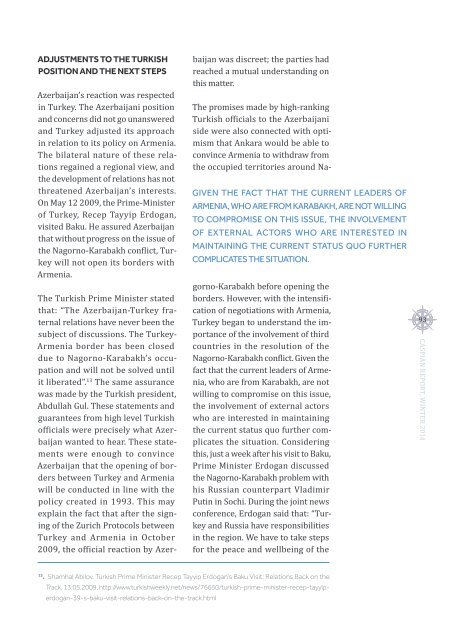Caspian Report - Issue 06 - Winter 2014
You also want an ePaper? Increase the reach of your titles
YUMPU automatically turns print PDFs into web optimized ePapers that Google loves.
ADJUSTMENTS TO THE TURKISH<br />
POSITION AND THE NEXT STEPS<br />
Azerbaijan’s reaction was respected<br />
in Turkey. The Azerbaijani position<br />
and concerns did not go unanswered<br />
and Turkey adjusted its approach<br />
in relation to its policy on Armenia.<br />
The bilateral nature of these relations<br />
regained a regional view, and<br />
the development of relations has not<br />
threatened Azerbaijan’s interests.<br />
On May 12 2009, the Prime-Minister<br />
of Turkey, Recep Tayyip Erdogan,<br />
visited Baku. He assured Azerbaijan<br />
that without progress on the issue of<br />
the Nagorno-Karabakh conflict, Turkey<br />
will not open its borders with<br />
Armenia.<br />
The Turkish Prime Minister stated<br />
that: “The Azerbaijan-Turkey fraternal<br />
relations have never been the<br />
subject of discussions. The Turkey-<br />
Armenia border has been closed<br />
due to Nagorno-Karabakh’s occupation<br />
and will not be solved until<br />
it liberated”. 13 The same assurance<br />
was made by the Turkish president,<br />
Abdullah Gul. These statements and<br />
guarantees from high level Turkish<br />
officials were precisely what Azerbaijan<br />
wanted to hear. These statements<br />
were enough to convince<br />
Azerbaijan that the opening of borders<br />
between Turkey and Armenia<br />
will be conducted in line with the<br />
policy created in 1993. This may<br />
explain the fact that after the signing<br />
of the Zurich Protocols between<br />
Turkey and Armenia in October<br />
2009, the official reaction by Azerbaijan<br />
was discreet; the parties had<br />
reached a mutual understanding on<br />
this matter.<br />
GIVEN THE FACT THAT THE CURRENT LEADERS OF<br />
ARMENIA, WHO ARE FROM KARABAKH, ARE NOT WILLING<br />
TO COMPROMISE ON THIS ISSUE, THE INVOLVEMENT<br />
OF EXTERNAL ACTORS WHO ARE INTERESTED IN<br />
MAINTAINING THE CURRENT STATUS QUO FURTHER<br />
COMPLICATES THE SITUATION.<br />
The promises made by high-ranking<br />
Turkish officials to the Azerbaijani<br />
side were also connected with optimism<br />
that Ankara would be able to<br />
convince Armenia to withdraw from<br />
the occupied territories around Nagorno-Karabakh<br />
before opening the<br />
borders. However, with the intensification<br />
of negotiations with Armenia,<br />
Turkey began to understand the importance<br />
of the involvement of third<br />
countries in the resolution of the<br />
Nagorno-Karabakh conflict. Given the<br />
fact that the current leaders of Armenia,<br />
who are from Karabakh, are not<br />
willing to compromise on this issue,<br />
the involvement of external actors<br />
who are interested in maintaining<br />
the current status quo further complicates<br />
the situation. Considering<br />
this, just a week after his visit to Baku,<br />
Prime Minister Erdogan discussed<br />
the Nagorno-Karabakh problem with<br />
his Russian counterpart Vladimir<br />
Putin in Sochi. During the joint news<br />
conference, Erdogan said that: “Turkey<br />
and Russia have responsibilities<br />
in the region. We have to take steps<br />
for the peace and wellbeing of the<br />
93<br />
CASPIAN REPORT, WINTER <strong>2014</strong><br />
13<br />
. Shamhal Abilov, Turkish Prime Minister Recep Tayyip Erdogan’s Baku Visit: Relations Back on the<br />
Track, 13.05.2009, http://www.turkishweekly.net/news/76650/turkish-prime-minister-recep-tayyiperdogan-39-s-baku-visit-relations-back-on-the-track.html










